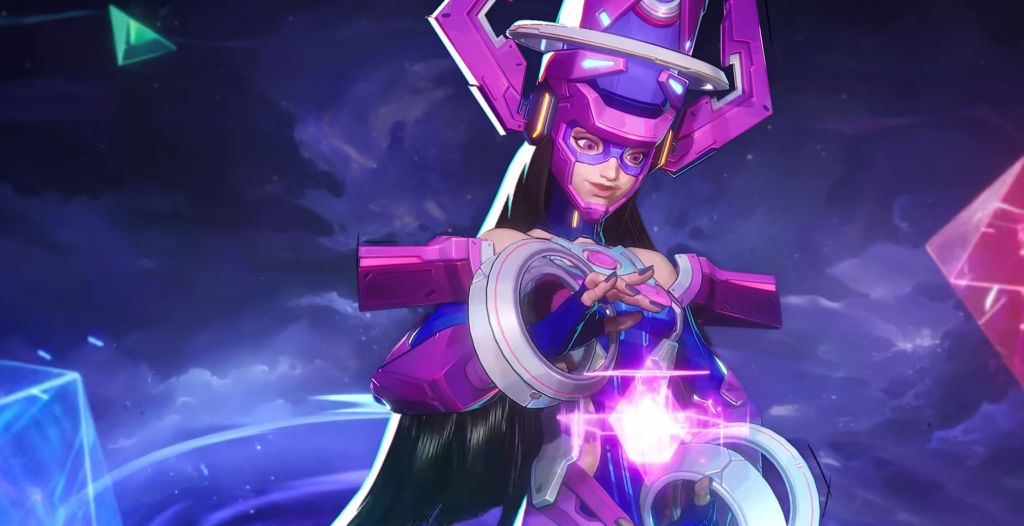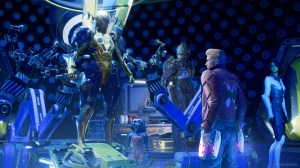No game more pleasantly surprised me this year than Guardians of the Galaxy. I’d written it off after a poor reveal, figuring MCU fandom would be the reason I played it. What I found was a game rich with heart, characters confidently stepping outside the looming cultural shadow of the MCU, and sharp writing. That last point is vital, because the thing about the Guardians is how they are always going on, bickering and sniping in the cosmos. That’s their schtick, and the game leans into this hard. The writing has to work—or the game doesn’t.
“I do remember at various points, as we were slowly assembling the whole game,” said executive narrative director Mary DeMarle in an interview with Waypoint, “a lot of people were like, ‘My god, these guys never shut up.’ [laughs] And even us, the writing team, we were like, “Oh yeah, they never shut up. This could be a good thing, or a bad thing?”
Videos by VICE
Guardians walks a tricky tightrope, but in the end, it was a very good thing, because it makes the game—and the characters—feel alive. It’s a chatterbox. If you’re not choosing to talk with a character, chances are someone else is ambiently talking to you or someone else. The game even comments on the most video game-y moments, like when the player goes searching for a hidden item, and the others are bored. There is almost always a piece of unique dialogue to poke fun at why the player is doing something that’s not mission critical.
“I think we stumbled into some of it, so we were never fully conscious of it,” said DeMarle. “It all stemmed from the initial decision that was made, when we get together and start conceiving of the game and we think ‘What is the player experience? What is this?’ And we came up with our guiding principle of ‘We want to have a dynamic team, we want you at the center of this team.’ What’s really cool about the team is that you’re hanging out with them.”

To see how it all felt, the team regularly took approved scripts and immediately shoved them into a text-to-speech program, allowing the writing, however rudimentary, to appear in the game. It’s not the same as having a professional voice actor deliver it, but it’s in the game.
For this project, DeMarle oversaw a team of writers, each of them embedded with individual chapter/level teams. (The game uses a chapter format.) Such an approach remains a relatively new phenomenon in games. In the grand scheme of things, it’s only recently that games have even credited “writers,” because often it was programmers, artists, or whoever accidentally raised their hand that was tasked with putting together the game’s script.
DeMarle, whose first gaming gig was landed by submitting a chapter of a personal sci-fi novel, has watched this evolution occur in real time. Her career started working in marketing at Hanna-Barbara—yes, the cartoon production company—before landing at Presto Studios, a 90s developer that specialized in adventure games like The Journeyman Project, and eventually worked on the third Myst game, Exile. At Presto, DeMarle met with the original Myst developers, Cyan, and her introduction was telling.
“I was introduced as ‘oh, and this is Mary, she’s our writer,’” and the president [of Cyan] was looking at me. ‘You’re a writer?’ [laughs],” said DeMarle. “We were trying to do all the introductions, but he kept coming back to me—three times. ‘You’re a writer!’” And then finally he’s like, “What do you do?’ ‘I write story.’ And the good news was after meeting him, after working with him [on] everything, he said ‘We need to hire a writer.’”
“I do remember at various points, as we were slowly assembling the whole game, a lot of people were like, ‘My god, these guys never shut up.’”
Myst III: Exile led to a contract with Relic, where she developed the story and script for the celebrated strategy game Homeworld 2, alongside overseeing the story for Myst IV: Revelation. These gigs set her up for Eidos Montreal, where she was the lead writer and narrative designer on the Deus Ex games produced in the past decade. It’s been a journey.
“When I first got into games,” said DeMarle, “what made [me go] ‘Oh, my god, I want to write for games,’ is the realization of ‘What if the player doesn’t do this?’ That player is your hero, but it’s not a passive medium.”
A few weeks ago, a clip from an IGN video featuring several old school Halo developers went viral, after they revealed how a major plot element only existed in the original game because a mission had been cut before release and now the story needed to be changed for totally arbitrary reasons.
This was—and remains—one of the important functions of writers working on games: helping the rest of the developers navigate the unexpected during the game’s production. On Guardians, having the writers embedded meant they were working hand-in-hand with the people building the combat encounters, puzzles, and everything else that goes into a level. It also meant there were people thinking about the production hiccups before they happened.
“I built a team of writers who became very close with each other,” said DeMarle. “We would have our Friday script reads, and we’d read each other’s scripts, and we would talk and we’d share. And so we were able, as a group, [to] already be brainstorming the solutions together. We’d see things coming and other people would say, ‘Well, we could do this, or we could do this, we could do this,’ and then we find the solution that we needed.”
That closeness paid off in different ways. Early on, Rocket tells Gamora about an old job they were on together, and then notes they’ve been on 14 missions. Sometimes, DeMarle noted, writers would dig into the comic books and throw out an easter egg for fans. In this case, it was an original idea, and the writers room became obsessed with figuring out what those 14 missions were. Internally, they wrote up ideas for those 14 missions, which allowed the other writers to sprinkle in references to them throughout the rest of the game.
Marvel’s films have dominated the box office for more than a decade, but it’s only recently the company has shown a real interest in games. I remember seeing the MCU’s origin story, Iron Man, a few weeks ahead of its theatrical release date because Sega was producing a mediocre video game alongside it. That’s how these things used to go, and why licensed games have, until recently, been seen as cheap cash-ins. They mostly suck.
2019’s Avengers, one of Marvel’s first attempts at seeking relevance in games, had issues beyond the way it fumbled its service elements. (I still liked it.) It was weird to look at a bunch of characters who kind of sort of resemble actors like Robert Downey Jr. and Chris Hemsworth and are clearly evoking their onscreen takes. It felt like a knockoff. We’re used to seeing new actors play Batman, but that’s not how characters like Iron Man have existed in pop culture. This is even truer for a group like the Guardians of the Galaxy, who went from functional obscurity to superstardom after the 2014 film made a talking tree named Groot a household name.
DeMarle’s first brush with the Guardians, like many people, was James Gunn’s films. (She was into comics at a young age, but was, also like many people, more of an X-Men person.)
“When we started on this project,” said DeMarle, “we asked Marvel, ‘Are we supposed to have the Guardians from the movies? What are we supposed to do?” And they said to us, ‘We want you to have your own take, as long as the heart of the characters are the same.’”

Easier said than done, specifically for these characters. Can you separate Drax, who speaks everything matter of factly, from actor Dave Bautista, who imbued that trait with such comedy and humanity? If you do, you risk alienating the audience. If you don’t, you risk rolling out a very boring copycat. It takes the game a little time to get there, but ultimately finds its footing in taking the cultural imprint from director Gunn’s films and doing what’s possible over the course of a 15-hour video game that’s much harder to do in a two-hour movie: depth.
“In the comic books, Drax is very much a tactician,” said DeMarle. “He’s a very strategic guy and he’s very intelligent. We’re like, ‘We’ve got to remember that.” I mean, people do love the literal nature of him, so let’s keep the literal nature of him, but we’ve got to remember that he’s got a depth to him, that he’s got a strength to him, and an intelligence to him.”
The emotional core of the films is Peter Quill and his relationship with his parents and the “found family” of the Guardians. Quill is the main character in the game, too, but the emotional core is Drax, whose backstory, which involves the loss of his family and the subsequent unhealthy obsession with Thanos, was largely stripped out of the two MCU movies.
“People just fell so in love with the comedic side of Drax they tapped into that, then they tapped into it more, then they really dug a hole into it,” said Bautista to the website Collider earlier this year. “But we missed a huge boat on that character and I don’t think it’ll ever come back around.”
Bautista is returning for at least one more film, before he’s expected to move on from the role.
One, Bautista is right. Two, all of that stuff is present in the game, it’s really good, and what’s special about what DeMarle’s team did with this group is how, over time, it leverages your cinematic familiarity with the characters to give them permission to lead them in a slightly different direction. Quill, for example, isn’t really a dopey jackass in this game; you get the sense he’s gone through that phase and, instead, doesn’t know how to lead.
What’s been interesting about the reception to Guardians is how frequently the most praised aspect of the game has been the writing. Frequently, writing is a support beam that helps make a game work, while players are dazzled by the visuals, set pieces, and mechanics.
“You pour your heart and soul into it, and you hope it’ll work, but you really don’t know,” said deMarle. “We did have a lot of playtests and the playtesters tended to really like it and come back with ‘The story is good.’ But then I’m the kind of person who, the more you hear that, the more you [think ‘’Something’s gonna go wrong, this is gonna be awful.’ So it is rewarding, for sure. I’m just really happy that people are having fun with it. And that’s the one thing I knew. Especially after the pandemic and all that—people need something fun and light. If we can give that to them [with] something that still has depth, which is something I was striving for, [I’m happy]. And so it’s really exciting to see that. I think we did it.”
Follow Patrick on Twitter. His email is patrick.klepek@vice.com, and available privately on Signal (224-707-1561).
More
From VICE
-

Peerapon Boonyakiat/SOPA Images/LightRocket via Getty Images -

Screenshot: NetEase Games -

Screenshots: Sony Computer Entertainment, Sony Interactive Entertainment, Ubisoft -

Screenshot: Electronic Arts

